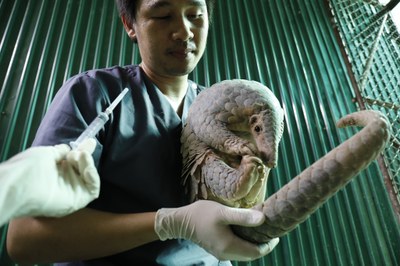In the Wake of COVID-19, USAID Supports Regional Action to Strengthen ASEAN Countries’ CWT Efforts
USAID Wildlife Asia has been advancing regional action towards ending wildlife trafficking in wildlife trade “hotspots” Southeast Asia and China through strengthened law enforcement and transboundary collaboration, evidence-based social behavior change campaigns to reduce consumer demand for wildlife products, and enhancing the political commitment and support of key government counterparts in the region to deter wildlife trafficking through effective laws and policies.
The project has trained over 1,400 people across the region on counter-wildlife issues, including law enforcement officers who have since participated in the most widespread environmental crime operations ever organized in recent years. Additionally, USAID Wildlife Asia has leveraged $11.5 million from private sector partnerships that are vital for the long-term sustainability of collective action against wildlife trafficking.
The project has supported the development of national Counter Wildlife Trafficking (CWT) laws which radically increased penalties for wildlife crimes: Thailand’s Wildlife Preservation and Protection Act and the Environment, which has been adopted and implemented; and the Natural Resources Code of Cambodia, which has been put forward for adoption. USAID Wildlife Asia has also supported the development of major CWT policies, foremost of which is the Chiang Mai Statement of ASEAN Ministers Responsible for the Convention on International Trade in Endangered Species of Wild Fauna and Flora (CITES) and Wildlife Enforcement on Illegal Wildlife Trade. The landmark agreement tackles ASEAN coordination on illegal wildlife trade, closing domestic wildlife markets where they contribute to poaching and the illegal wildlife trade, enhancing domestic legislation, reaffirming stronger responses to corruption and money-laundering, and ensuring continued efforts on networking between law enforcement agencies.
The project continues to provide support as ASEAN countries seek to step up their counter-wildlife trafficking efforts, especially in the wake of the COVID-19 pandemic. USAID Wildlife Asia is now supporting the development of the updated Regional Plan of Action for Fighting Wildlife Trafficking that will help strengthen CWT efforts at the regional as well as national level.
“Wildlife trade is not only pushing wildlife species to extinction, but also spreads zoonotic diseases that threaten human lives and even economic development. It is a critical factor in the current crisis, which will not go away unless we change our relationship to nature. Protecting wildlife and their habitats can help prevent future pandemics, and promote global security and sustainable development,” said USAID Wildlife Asia Chief of Party Peter Collier.


